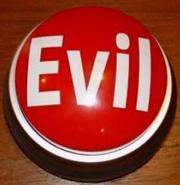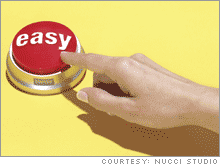
“It seems that advertising agencies think that they can cram any amount
of factitious crap down the gullible throats of the public. We need to
remind them we are a heck of a lot smarter, and can process far more
complex equations, just given half a chance. … As a business owner of
25 years, I found the mere notion of pushing a magic button which
solves all problems a slap in the face. Business is not easy. It takes
a great deal of blood, sweat, tears, skill and perseverance to make it
all happen. I couldn’t sit idly by when I saw this.” — Crazy Al Cohen, who has published a PDF guide for hacking Staples’ EASY button into an "EVIL" button. (In an interesting twist, Cohen recorded his comments onto the EASY button’s hard drive via the built-in speaker which can be rewired to receive as well as transmit.)
Mind you he does have a point. I mean, why exactly is it more easy to get office supplies at Staples than any other big box retailer? It isn’t.
Despite the hype, it seems to me the EASY button campaign is an amazing accidental hit for the office products giant. And the attempts to link the button’s success back to an incredible consumer insight are the result of the reductive analysis that so often characterizes "brand analysis."
Every now and then an idea just works. It plugs right into our culture and takes off.
And the EASY button is a big hit for Staples. So big in fact that they have sold 300,000 shrink wrapped buttons already and the idea has been credited with helping drive Staples to the top of the office products hit parade.

To think the EASY button developed out of Staples’ drive to improve customers’ ability to find products in their stores (which small business owner has not spent hours hunting paperclips down featureless isles? I know I have).
"The five-year branding odyssey that began in 2001 has helped make $16.1
billion Staples the runaway leader in office retail. In 2005 its profit
was up 18 percent to $834 million." Business 2.0.
But it is an unfortunate by-product of user generated content like Mr. Cohen’s mad rant (and amazingly detailed PDF), that no matter how effective an idea becomes, someone, somewhere, will be upset by it.
I’m reminded again of Bogusky’s comment about Subservient Chicken: "I like that they are talking about the work. If they aren’t talking, then your brand is dead."
Post a Comment